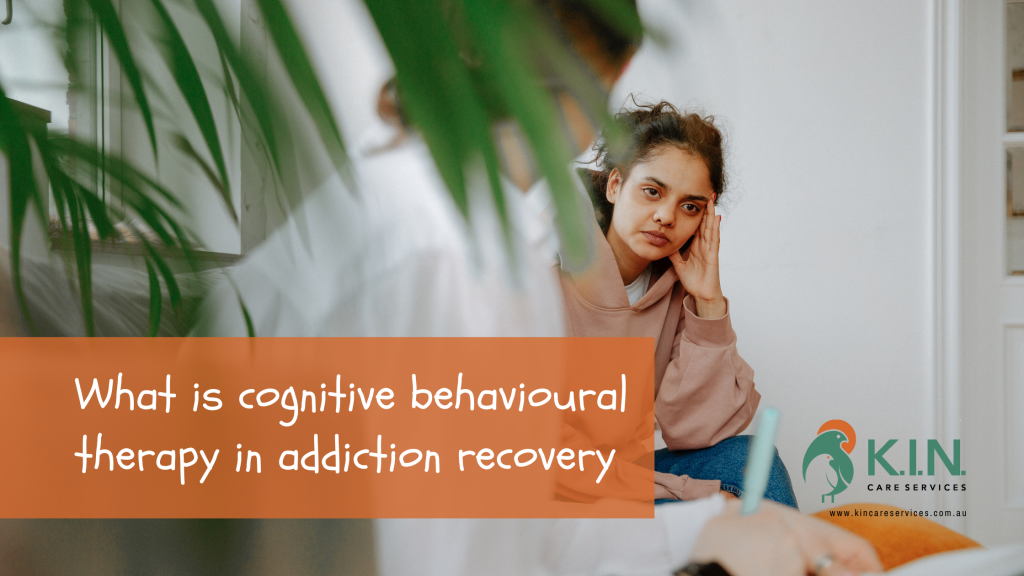Recovering from addiction is a long battle. It requires constant vigilance and care of loved ones on their chosen path to recovery. For many affected loved ones, this may mean attending regular therapy sessions, working with a counsellor or therapist; or even joining a recovery group. Everyone’s journey to recovery is different, and some options work better for some and not others. There is no right or wrong solution for addiction recovery.

In this blog, we will expand on one type of therapy for addiction recovery called cognitive behavioural therapy or CBT.
Cognitive behavioural therapy scientific definition
Cognitive behavioural therapy is psychotherapy that aims to change one’s thinking and behaviour patterns. By addressing both thoughts and behaviours, CBT helps people see how their thoughts and behaviours are connected and how they can change them to improve their mental health.
Cognitive behavioural therapy is among the top therapies scientifically proven to be an effective treatment option for those suffering from drug addiction. It can help individuals overcome harmful urges and change destructive patterns that once led them toward substance abuse.
What does Cognitive Behavioural Therapy look like?
In counselling, a client may present with a certain problem, such as drug addiction or suicidal thoughts. These problems are not actual issues but rather a symptom of the real issue. The problem is the client’s thinking pattern or “beliefs.” To help, the counsellor needs to get to the root of the problem and change the client’s thinking pattern. The root of the problem is not drinking, suicidal thinking, or depression; the root of the problem is the way the client is thinking or what the client fears to let go of. CBT addresses this; it ‘cuts to the chase’ and helps the client see a better perspective.
Examples of real cognitive behavioural therapy
Here are a few examples of cognitive behavioural therapy techniques that are generally used:
- GUIDED DISCOVERY: This technique teaches individuals how to consider different perspectives from their own. Questions that both support and challenge your current beliefs will be asked.
- ROLE-PLAYING: The therapist will have their patient play out various scenarios that are directly related to struggles one might face in recovery such as turning down an invite to use or a stressful situation where drugs were the go-to coping method. Patients can explore potential outcomes and feel more prepared when those situations do eventually arise.
- COGNITIVE REFRAMING: At its core, CBT is all about changing a negative pattern of thinking. Revisiting times we’ve been wrong, cruel, or selfish isn’t easy, but the reward is self-discovery and a greater ability to reflect in the moment.
- JOURNALLING: Sometimes things that are difficult to speak out loud are easier to write on paper. Journaling is also beneficial in that it serves as an outlet for those who might not have anyone else to talk to.
- STRESS MANAGEMENT: Drugs are often used as a coping mechanism for stressful situations. Having healthy alternatives to alleviating stressful moments or reacting to them is pivotal in undoing the habit to turn to substances to manage.
What are its benefits?
Cognitive behavioural therapy is scientifically tested & proven to be an effective treatment option based on sound psychological principles. It helps treat various mental health issues, such as depression, anxiety, eating disorders, substance abuse, etc.
Unlike other forms of therapy, CBT. is usually shorter in duration, as it focuses on specific issues and goals. It also lacks side effects, as it is a non-invasive therapy.
Substance Abuse Support Services
If you, a loved one, or a close relative is struggling with substance abuse, we can help. At K.I.N. care services, we offer support services to help individuals overcome addiction and live a healthy, substance-free life. Our services include;
- Educating individuals about the risk of substance abuse and addiction
- helping individuals identify their triggers and warning signs
- providing support and encouragement throughout the recovery
- teaching healthy coping mechanisms and stress management techniques
- developing an aftercare plan to prevent relapse.
- Providing individualised counselling
- Offering family support services
- Helping you find sober living accommodations
- Connecting you with community resources
- facilitating referrals to specialists, government and non-government organisations, and agencies
We know that recovery from drugs and substance abuse is possible, and we are here to help you every step of the way.


